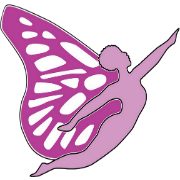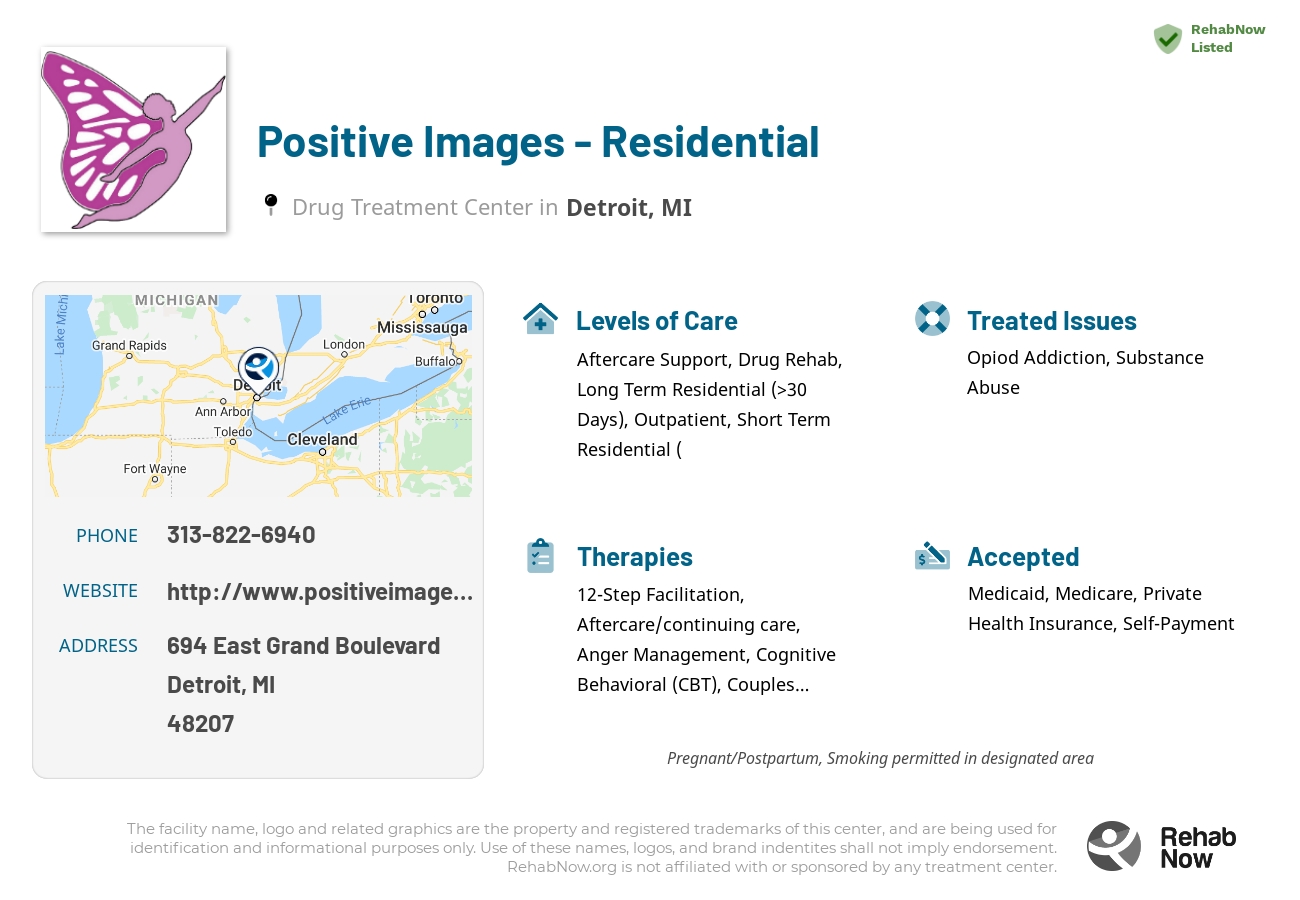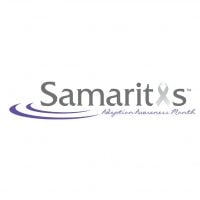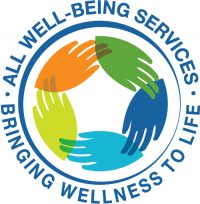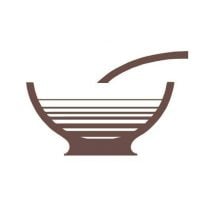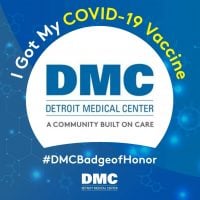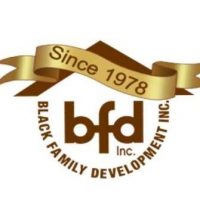Positive Images - Residential
Drug Rehab Center in Detroit, Michigan
Positive Images - Residential is a substance abuse and addiction recovery center in Detroit that provides a range of services, including medical and mental health assessments, counseling, relapse prevention, life skills and recovery training, and a 12-step program, and offers financial assistance to those who cannot afford treatment.
About This Michigan Facility
Positive Images - Residential is a substance abuse and addiction recovery center located in Detroit, Michigan. It provides a variety of treatment and support services for individuals struggling with substance abuse. These services include medical and mental health assessments, individual, group, and family counseling, relapse prevention, life skills and recovery training, and follow-up services to promote long-term abstinence. In addition, Positive Images - Residential has a robust 12-step program to help individuals build the skills necessary to recover from substance use disorders.
Positive Images - Residential provides a number of additional treatments to help individuals overcome their addictions, including cognitive behavioral therapy, education about the consequences of substance use, coping skills for dealing with cravings and emotions, and support for finding healthy activities. There are also a variety of activities available to help individuals build self-esteem, develop social connections, and participate in recreational activities. As part of its commitment to providing quality care, Positive Images - Residential also offers financial assistance to help individuals who cannot afford treatment.
Positive Images - Residential has been accredited by the Commission on Accreditation of Rehabilitation Facilities and is licensed by the Michigan Department of Health and Human Services to provide substance abuse treatment. Positive Images - Residential also offers a variety of holistic services to supplement addiction treatment, such as yoga and mindfulness meditation, nutrition consultation, creative expression, and recreational therapy. The facility also works with individuals to develop personalized relapse prevention plans and offers ongoing aftercare and alumni support groups.
Genders
Ages
Modality
Additional
Conditions and Issues Treated
Rehab centers in Michigan exist to help individuals bounce back from substance abuse. Drug addiction refers to the use of illegal drugs and improper use of prescription drugs. Substance abuse includes all problems that stem out from using psychoactive substances. Centers like Positive Images - Residential are here to help.
Opioid addiction is one of the most common forms of addiction Michigan. Opioids include drugs like heroin, oxycontin and fentanyl. They are prescribed to treat pain, but they are often abused and they are addictive. The addiction is treated by detoxing the body, so it no longer needs the chemicals in the drugs. This is followed up by therapies to correct behavior and target the root of the problem.
Levels of Care Offered at Positive Images - Residential
This center offers a variety of custom treatment tailored to individual recovery. Currently available are Aftercare Support, Drug Rehab, Outpatient, Residential, with additional therapies available as listed below.
An Outpatient Rehab Program is a part-time drug rehab program for treating individuals in Detroit, MI with mild addiction or mild-to-moderate drug withdrawal symptoms. It generally requires about 10 to 12 hours every week.
Doctors can administer on-the-spot medication to ease withdrawal symptoms such as anxiety, increased heart rate, and even depression. Groups such as Alcoholics Anonymous (AA) and Narcotics Anonymous (NA) can be used as a part of outpatient treatment to help maintain sobriety.
Residential treatment programs are those that offer housing and meals in addition to substance abuse treatment. Rehab facilities that offer residential treatment allow patients to focus solely on recovery, in an environment totally separate from their lives. Some rehab centers specialize in short-term residential treatment (a few days to a week or two), while others solely provide treatment on a long-term basis (several weeks to months). Some offer both, and tailor treatment to the patient’s individual requirements.
Aftercare Support at Positive Images - Residential, in short, is the support provided to a patient after they have finished treatment. It allows them to adjust to everyday life. It may entail setting them up and enrolling them in services such as Narcotics Anonymous (NA) and Alcoholics Anonymous (AA) inside a halfway house. Career coaching may also be offered to patients to help them get back into the workforce.
Therapies & Programs
Therapy for couples decreases unhealthy behavior in a relationship that can trigger addiction. Either, or both, members of the couple will be improved by this. This treatment administered by Positive Images - Residential still targets addiction and can also make a relationship healthier through a variety of methods.
Group therapy occurs in a group setting as opposed to a one on one setting. It benefits patients by providing a feeling of support and letting them know they are not alone. Patients at Positive Images - Residential also learn to build trust and understanding and gain perspective through discussions.
After experiencing trauma, it’s crucial to look for a facility that can provide trauma therapy. This approach zeroes in on the traumatic incidents that a patient has encountered in the past, recent or not. It’s been widely known that trauma can make an individual resort to alcohol or other substances to mask their troubles and pain. Trauma can originate from domestic violence, sexual abuse, an early encounter with death, sexual assault, and many more. The goal of trauma therapy at Positive Images - Residential in Detroit, MI is to help the patient see beyond the trauma and move forward. Mental health professionals will facilitate the patient’s journey and see to it that he or she is no longer a victim of his or her traumatic experiences and has wholly regained his or her personal power.
DBT, also known as dialectical behavior therapy, is a form of cognitive behavioral therapy (CBT) that helps people understand how their thoughts, behaviors, and feelings all connect. This can give them more control over their actions, effectively stopping self-harm ideations and attempts in some patients. It can also help put people in control over some mental struggles, like borderline personality disorder.
Most individuals suffering from addiction have low self-awareness, so they end up making poor decisions. Cognitive Behavioral Therapy (CBT) is suitable for patients recovering from an addiction of any kind. Through it, patients become more aligned with their thoughts, emotions, and behaviors, giving them a better opportunity to respond appropriately to temptations and negative feelings.
This therapy modality at Positive Images - Residential in Detroit, MI strengthens a person’s ability to stay on top of their emotional state and learn new stress management techniques so they won’t give in to the temptations easily. Moreover, CBT helps people communicate and express their emotions well, which can be vital in relapse management. CBT is also suitable for managing co-occurring disorders like depression and bipolar illness.
A 12-Step Program is a common method that is used to treat addiction. This format is used for both drug and alcohol treatment. It is extremely popular and successful for large numbers of people. It is a relatively simple set of steps that are done continuously in order to move through life with awareness, accountability and honesty. 12-Step programs are available in most every city in the Unites States. They are available in person, electronically and virtually through phone or web-based meetings.
Payment Options Accepted
For specific insurance or payment methods please contact us.
Is your insurance accepted?
Ask an expert, call (888) 674-0062
Additional Details
Specifics, location, and helpful extra information.
Detroit, Michigan 48207 Phone Number(313) 822-6940 Meta DetailsUpdated November 25, 2023
Staff Verified
What else do people call Positive Images – Residential?
People have occasionally also searched for “Positive Images Residential in Michigan”
Patient Reviews
There are no reviews yet. Be the first one to write one.
Detroit, Michigan Addiction Information
Michigan has the second-highest rate of drug and alcohol abuse in the nation. Heroin is linked to more than 50% of the state's hepatitis C cases. Marijuana is the drug most often associated with crimes in Michigan, followed by methamphetamines. Opioids alone are responsible for almost 20% of all drug overdose deaths in Michigan.
Over 1,000 drug-related overdose deaths occurred in Detroit, Michigan, in 2017 alone. Opioids (42%) and benzodiazepines (22%) are the most common drugs involved in overdose deaths. Drug overdoses killed more people in 2016 than homicides. In Detroit, Michigan, there are a variety of drug rehab centers to choose from. The most important thing is to find a facility that will best meet the needs of the individual.
Treatment in Nearby Cities
- Escanaba, MI (308.7 mi.)
- Albion, MI (89.5 mi.)
- Berrien Center, MI (169.8 mi.)
- White Cloud, MI (162.1 mi.)
- Lexington, MI (67.2 mi.)
Centers near Positive Images - Residential
The facility name, logo and brand are the property and registered trademarks of Positive Images - Residential, and are being used for identification and informational purposes only. Use of these names, logos and brands shall not imply endorsement. RehabNow.org is not affiliated with or sponsored by Positive Images - Residential.
